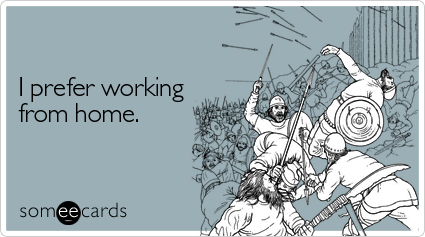Or, as I like to call it, what tips are legit, and what are bullshit. Here’s what I’ve learned from a couple of years working both in an office and from home, and a year of working exclusively from home.
Legit Tips:
- Figure out your optimum schedule. I’ve discovered that I’m most productive early in the morning, and then later in the evening. There’s a point in the early afternoon where my brain definitely slows down, so I’ve learned to schedule downtime for around 12 – 2 pm. I also have a burst of motivation late at night, so I will on occasion just work all night and sleep the next day. You have to find the right timing, because working from home means your bed is awfully nearby.
- Act like you’re in the office. For me, this entails avoiding anything that I wouldn’t normally do inside a workplace. For you, that might mean no naps, no beer breaks, no spending excessive time in the restroom or on a cigarette break. I know, I know, there’s that whole “write drunk, edit sober” thing. This does not personally work for me in any sort of professional context. When I’m writing my own blog posts or working on my book ideas, sure, I might have a glass of wine. But working for anyone else – no, not touching it. Also if you pretend you have people waiting to use the restroom you will be less inclined to linger in there and procrastinate by plucking your eyebrows or playing Angry Birds.
- Determine what degree of interaction your boss/manager prefers. I just read this one over at LifeHacker, and it’s an excellent point. I’ve had managers that got annoyed with me if I contacted them more than once a week, and other managers who wanted to be in contact at least 5-6 times a day. One style will likely work best for you, but you need to cater to the person signing your paychecks on this one.
- Minimize distractions in a logical way. Oftentimes people suggest that you just disconnect from the internet and voila, easy peasy, you’re uuber productive. That ain’t the case for most of us, though. First, there’s the unavoidable fact that many work-from-homers rely on the internet for reference, communication, or resources. I write for websites, and assist with social media, so there’s no way for me to just unplug the wireless router and be done with it. I do, however, hide the iPad and iPhone in my room, along with whatever book or magazine I’m reading at the moment. If I see them, I will want to read one more page, check my stupid Dream Zoo animals for just a moment, or send just one more text. We all know how that goes!
- Schedule posts and tweets to avoid temptation later. This is something that I do anyway, because my inspiration tends to come in big waves and then disappear for days. So, left to my own devices, I might publish 15 blog posts in an afternoon, and then forget to post for another month. This does not a successful blogger make. It also can interfere with my work, because those bursts of creativity also fuel my professional writing. I manage these tendencies by scheduling all of my new posts to publish at regular intervals throughout the day. I put them in a specific order, spaced out in specific increments, so any spur of the moment posts will screw up what I’ve planned. I do this with Twitter, also, using HootSuite. If I have a brilliant thought that I want to tweet (like I often do), I jot it in a notepad file and schedule it for tomorrow. Sometimes there are timely issues that need to be addressed, so I save those type of tweets/posts for my lunch break. (This article was written the evening of Monday, January 30th, but it’s scheduled to automatically publish while I’m working – 12:15 pm on Tuesday, January 31st)
- Make sure friends and family understand the nature of your work/availability. I’m lucky – I’m very close with my family, but they understand that I’m not available all the time even though I’m at home. If your friends and family don’t understand that, you might need to escape to an alternate location, block their calls, or have a strongly worded conversation or two to get your point across.
- Use whatever tools your boss/manager prefers. Personally, I hate Skype. Each time I’ve installed it, it has inserted its stupid Skype code into the back-end html of sites that I’ve been working on, and that seems like something they shouldn’t be able to do automatically. I also don’t have much interest in seeing someone face to face for a phone convo – probably because I’m in my pajamas (see below). But, I’ve had bosses that use Skype religiously. Do I stage a protest and try to get them to abandon this method of communication? No, of course not. I suck it up and wash my face and have the convo, because I defer to the wo/man for this sort of thing. I don’t constantly bitch about it, either, though I have been known to send out an “I HATE SKYPE” email when it’s screwed up something for me.
- Get into a routine. This is probably the number one tip that has helped me the most, which is funny, because it’s so simple. It shouldn’t even be a tip, but since it took a while for this to occur to me, I’m sharing it with you. Don’t just shuffle out of bed at any hour, plop down in front of the computer, and start slogging away. (unless that’s your routine, in which case, hey, go on with your bad self). I’ve discovered that I need about half an hour to wake up, feed the cats, make coffee, etc. Then I need another hour or so for scheduling blog posts, checking my fave sites, going through emails, etc. I’ve also found that I’m most productive when I have a huge mug (some might say vat) of coffee at hand, and some snacks that I can blindly reach for when I’m involved in a task.
Bullshit Tips:
- Dress like you’re in the office. Maybe this helps for you, but wearing my comfies while working is my favorite thing about doing it all from home. I rock my pajamas nearly 24-7 some weeks! To be fair, though, most of my post-college jobs have been for internet companies with no in-person customer interactions, so the dress codes have been pretty lax. I suggest wearing whatever is comfortable – I think it’s actually better for productivity. When in my yoga pants and built-in shelf bra tank top, for example, I am free from all manner of distracting clothing issues. No underwire escaping from bra and stabbing my armpit, no too-tight buttons at my tummy, no constricting jeans that inhibit my ability to sit in odd but comfortable positions at my desk. I don’t care if I spill coffee on my old ratty sweatshirt, and I can adjust my clothing according to any room temperature. All of this equals a happy Corina that can focus on work!
- Don’t listen to music. Or, listen to music with headphones, so it’s more like an office environment. Um, no. I need music to keep me functioning, and there’s no reason for me to wear headphones when alone at my own house. Besides the fact that half the time people wear headphones in the office to block out annoying coworkers, or to avoid potential conversations with said coworkers. Or is that just me? The only time I pop on the earbuds now is if there’s something really loud or grating that I’m trying to tune out.
- Note exactly how much time you spend on each assigned task. Who has time to do this? I’ve had bosses that expect this, and they don’t seem to understand how counterproductive it is. If I have 8 hours in a workday, and you’re expecting me to spend 15 min every hour to track my progress, then you’re effectively cutting out TWO HOURS that I could have used for, you know, actual work. Not to mention how disruptive it can be once you’re in the work zone and then you have to audit your hours to prove that you’re actually working. Working from home will NOT work if trust is lacking on either side. You have to be able to trust that your manager will give you reasonable direction, keep you supplied with assignments, and pay you for your efforts. They have to trust that you’re actually working when you say you are, and that your method/schedule for accomplishing projects is up to you. When the trust disappears for any reason, it breeds resentment for both parties. This is the opposite of what you want!
- Keep an eye out for new emails from your boss. In theory, this makes sense. You should be receptive to receiving emails from your boss when you’re on the clock for them. But in reality, it often backfires. You can’t devote your entire focus to any task when you’re keeping an eye out for anything else. Plus, it’s not like only your boss emails you. It’s so easy to get sucked in to reading and responding to emails, and that can take you totally off task. I’ve also found that this practice produces a fair amount of anxiety for me. I have no reason to feel anxious – I do a good job, pride myself on my ethics and morals, and wouldn’t dream of trying to take advantage of the situation. But somehow I think that someone else will think that I’m just screwing around and pretending to work. I’ve also never, ever, shoplifted in my entire life (not even a pack of gum or anything when I was a kid!) but I have an irrational concern that retail establishments will think I’m trying to steal stuff. I’m seriously careful to keep my purse closed and tucked under my arm, just in case for some reason they think I’m slipping socks in there or something. So this one might be more of a personal thing. :) Point being, I get worried that an email from the boss will indicate that I’m in trouble for who knows what, or it will have additional assignments that might be overwhelming, etc. So I try to check at scheduled intervals, unless there’s a project that requires more in-depth back and forth.
- Work all the time to finish a project, because you’re at home and you can. This was a problem for me for a loooong time, and it started in the office. If I felt like it was my fault that I hadn’t accomplished something that I should have had the time for, I would take it home. If there was some other factor, like a new assignment that took priority, I wouldn’t worry about it. But I realized that I wasn’t just wrapping things up at home…I was working extended hours that I wasn’t getting paid for. When I started to work from home, I couldn’t handle the transition. The computer is right there, and my assignments are right there, so I might as well just tough it out, right? Wrong. Working more than 8 hours in a day is technically overtime, but your manager isn’t going to pay you extra just because you did Tuesday’s work on Monday night. When you do that, you’re also setting up unreasonable expectations. If the assignment took you 12 uninterrupted hours, but you did it all on one day, your boss might think you only need 8 hours. Next time something similar comes up, you might not have that block of 12, so you won’t finish until the next day. Boss then thinks maybe you were slacking off, and is disappointed in you for going slow – even though you’re actually a fast worker. I have a hard time with this one, because I like to get up really early (for me 6 is really early, ok?) and then end in the early afternoon. But if I’m done at 3 pm, I feel like I should be working for another couple of hours, even though I’ve put in 8 already. I haven’t quite adjusted to this one :)
- Clock out when you’re not actively typing/using Photoshop/etc. If you’re screwing around online, sure, you should clock out. Don’t violate that trust by expecting to be paid when you’re not working. But time spent researching, brain-storming, and editing is still time spent working. I think this is a problem for creative types in particular – or at least for me. I usually have to just stare at the screen, sorting out ideas in my head. Then I might rearrange one sentence like fifteen different times, until it’s exactly how I want it. That’s not a waste of time, though, and it’s not me slacking off. That’s me taking the time to provide work that is up to my standards of quality. Similarly, graphic designers might need to spend extended time moving one layer back and forth incrementally when using Photoshop, and coders might need to tweak one tiny part of html dozens of times. To the outside observer, it might not look like work, but that’s because it’s work that is happening in your brain.
I think that’s all for now. I hope this has been helpful, or perhaps even entertaining? Now I’m going to head to bed, and let this publish tomorrow at 12:15!









Leave a Reply